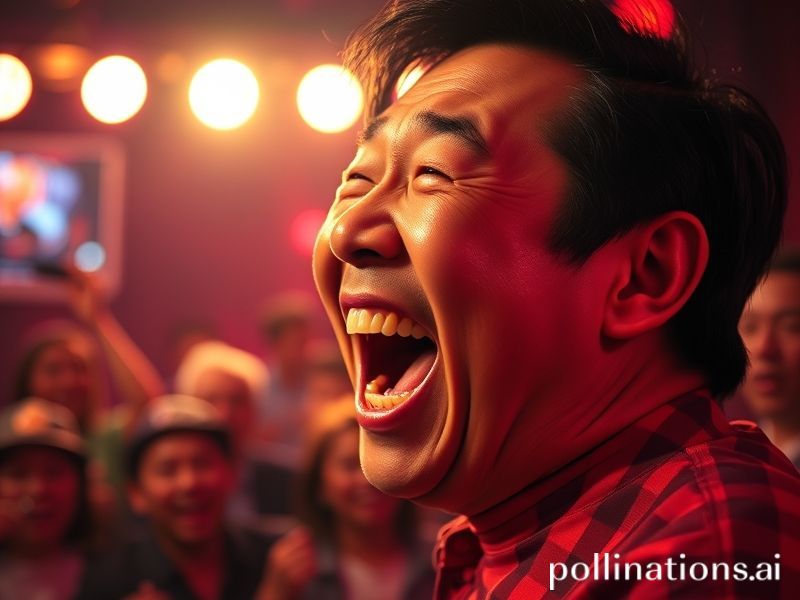Ken Jeong: How a Korean Doctor Became Hollywood’s Favorite Global Jester
**From Seoul to Hollywood: The Ken Jeong Phenomenon and the Globalization of the Asian Everyman**
*By our correspondent who still can’t believe a doctor gave up medicine for this*
In the grand theater of global entertainment, where cultural exports serve as accidental ambassadors and sitcoms become soft-power weapons, few figures embody the absurd contradictions of modern fame quite like Ken Jeong. The Korean-American actor who transformed from a practicing physician into a screaming, pants-less international sensation represents something far more significant than another Hollywood success story—he’s living proof that in our interconnected world, cultural stereotypes travel first-class while actual cultural understanding takes the bus.
The global implications of Jeong’s career trajectory—from New Orleans doctor to Hangover trilogy staple to Netflix special headliner—mirror the broader Asian diaspora experience: expected to be the model minority, but rewarded most handsomely for playing the fool. His breakthrough role as Leslie Chow, the manic gangster who spoke in broken English while outsmarting everyone, became a worldwide phenomenon precisely because it offered Western audiences the comfort of the “crazy Asian” trope wrapped in the guise of self-aware parody. International box office receipts don’t lie: the Hangover films grossed over $1.4 billion globally, with Jeong’s scenes becoming YouTube gold from Mumbai to Manchester.
What’s particularly fascinating about Jeong’s global appeal is how different cultures have embraced him for vastly different reasons. In South Korea, he’s celebrated as a success story of the diaspora, proof that Koreans can make it in Hollywood—even if it requires playing characters that would make their grandmothers weep. Meanwhile, in countries with significant Asian populations like Canada, Australia, and the UK, he’s become something of a Rorschach test: either a trailblazer who opened doors or a convenient excuse for casual racism (“But Ken Jeong does it!”).
The international success of Jeong’s Netflix special “You Complete Me, Ho”—filmed at the Ice House Comedy Club in Pasadena but streamed into 190 countries—reveals our collective appetite for immigrant success narratives. That the special’s title plays on both his wife’s maiden name and a term of endearment shows the kind of linguistic gymnastics required for global consumption. It’s bilingual wordplay that works whether you’re watching from a Seoul high-rise or a São Paulo favela, assuming you have Netflix, WiFi, and the existential despair necessary to watch stand-up comedy at 3 AM.
Perhaps most tellingly, Jeong’s recent turn as a game show host on “The Masked Singer”—a format imported from South Korea—represents the full-circle absurdity of global entertainment. A Korean-American hosting an American version of a Korean show featuring celebrities in elaborate costumes singing for judges who pretend to guess their identities. It’s like cultural telephone played across continents, where the message becomes increasingly garbled but the checks clear in any language.
The darker irony, of course, lies in what Jeong’s success reveals about the international entertainment industry’s willingness to embrace Asian talent—provided they’re willing to lean into stereotypes that would be unacceptable if applied to other ethnic groups. His career suggests that global audiences are ready for Asian stars, just not Asian complexity. The world will take its Asian men as comic relief or martial artists, but rarely as romantic leads or dramatic heroes.
As streaming platforms continue erasing geographical boundaries and Hollywood chases international box office dollars, Jeong’s career offers a cynical roadmap for aspiring Asian entertainers: get your medical degree first, just in case the world isn’t ready for you to be taken seriously. In an era where cultural representation has become both a business imperative and a minefield of expectations, Ken Jeong stands as the accidental everyman—proof that in the global village, the court jester speaks universal truths while the village elders argue about what he really means.
The joke, it seems, is on all of us.







